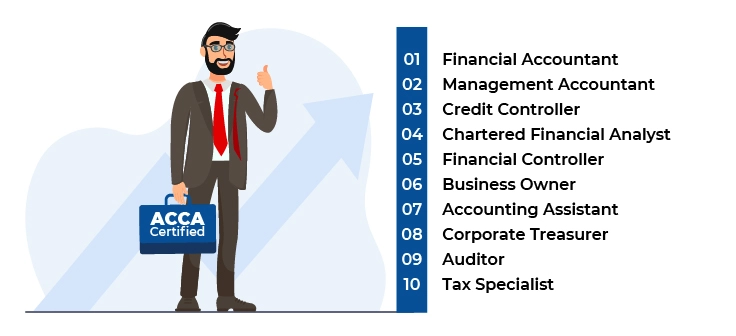 Vishal Kashyap
Apr 15, 2025
Vishal Kashyap
Apr 15, 2025

If you are considering or already pursuing an ACCA course, it's natural to wonder about the job opportunities that await you upon completion. The Association of Chartered Certified Accountants (ACCA) is a global professional accounting body that accredits and supports accountants worldwide. The primary benefit of completing the ACCA course is the opportunity to become a member of this association.
Want to know what is ACCA? Here is a brief introduction to the ACCA Exam.
ACCA certification is based on international accounting and auditing standards that are recognized in many countries and regions. It equips you with the knowledge and skills required to evaluate business solutions. As a result, completing ACCA training can significantly enhance your prospects for ACCA global jobs.
To start with your certification journey, you must first understand the ACCA Exam Pattern and Structure. Then it is important to research and prepare for the exam according to the syllabus. There are several job roles that you can explore after completing the ACCA course.
ACCA career opportunities are vast and varied. If you are wondering what can I do after ACCA, the answer is here. The ACCA job roles you can explore after completing the ACCA Course include the following:
The ACCA career path can begin with the role of an accountant. However, after earning an ACCA certification, you can explore career opportunities in financial accounting. Financial accounting is the process of recording, summarizing, and interpreting commercial transactions that occur over a specific period.
A financial accountant’s responsibilities include:
According to a report by the ACCA, there are currently over 650,000 financial accountants globally with ACCA certification. This number is expected to rise in the next decade as more organizations recognize the need to have certified financial accountants on their teams.
Management accounting plays a vital role in finance, offering career opportunities in public practice, corporate and public sectors, financial services, and shared service organisations. Management accountants provide a broad range of essential financial analysis services to organisations. This will include.
Although management accountants may appear to have a similar role to financial accountants who provide financial statements to external organisations, their responsibility extends beyond that. They are responsible for:
According to a report by the ACCA, there are currently over 620,000 management accountants globally with ACCA certification. This number is expected to rise by 15% in the next decade.
Credit Controlling is another remarkable role an ACCA aspirant can pursue after ACCA Course completion. Managing debt and ensuring the efficient operation of credit management services are the primary responsibilities of a credit controller. Their duties include:
To ensure the effective operation of credit management services, credit managers must maintain strong customer relationships. According to ACCA, there are currently over 270,000 credit controllers globally with ACCA certification. This number is expected to increase by 10% in the next ten years.
If you're looking for the best degree to support your financial career after ACCA, then CFA might be your go-to option. It is recognised by the top organisations around the world, including the Big Four (Deloitte, PricewaterhouseCoopers (PwC), Ernst & Young (EY), and Klynveld Peat Marwick Goerdeler (KPMG)).
To be a Chartered Financial Analyst (CFA), the candidates are required to complete a rigorous program of study that covers topics such as investment analysis, financial reporting and analysis, asset valuation, portfolio management, and alternative investments.
The program also covers ethical and professional standards of the investment management industry. To become a certified ACCA, the CFA candidates must pass three levels of exams and have at least four years of professional experience.
In addition, they must stay up-to-date with the latest developments in the financial industry and must also be knowledgeable in taxation, economic trends, and securities regulations.
As per ACCA, there are currently over 270,000 Chartered Financial Analysts (CFA) globally who have already obtained ACCA certification. The number is expected to grow by 10% over the next decade.
A Chartered Financial Analyst is responsible for delivering the following services:
If you have earned an ACCA qualification, learning and completing a CFA could be relatively easy.
A financial manager, also known as a "financial controller," is usually the chief manager of an organisation.
Financial Controllers are responsible for the organisation's accounting department, ensuring that the company and legal needs keep the organisation's financial records and books. While these auditors primarily focus on historical records, they also perform other tasks, such as budgeting processes, compliance audits, and financial data valuations.
Financial controllers with ACCA certification typically earn an average of 20% more than those without certification. They are more likely to be promoted to higher positions, such as the Chief Financial Officer (CFO) or Head of Finance.
According to the ACCA, after obtaining an ACCA certification, over 85% of financial controllers become financially successful within two years. It has been reported that those with an ACCA certification have an employment rate of over 99%. Currently, there are over 1.5 million financial controllers worldwide who have acquired ACCA certification. This number is projected to grow by 15% over the next decade.
Getting ACCA qualified can help run your business in finance and other fields in a variety of unexpected ways. For example, you can set up your consulting firm or act as an independent financial advisor for small businesses and freelancers.
Becoming an ACCA-qualified business owner means you can:
Being ACCA-certified opens up more opportunities for growth and increased responsibility within a business. Currently, there are over 1.2 million business owners with ACCA certification, and this number is expected to grow in the coming years.
Accounting Assistants are junior accounting personnel directed by an organisation's Finance Director or Finance manager. Job roles of an Accounting Assistant may vary from organisation to organisation.
An ACCA-qualified accounting assistant can be responsible for the following tasks such as
Despite the most common tasks of accounting and managing an organisation's financial accounting, they also manage collections and records and prepare financial and payslips.
ACCA data shows that there are currently over 3.5 million accounting assistants worldwide who have acquired ACCA certification. This number is projected to grow by 25% in the coming years.
A Corporate Treasurer is responsible for managing the financial resources of an organisation. They also work closely with other departments to ensure that financial needs are met.
The responsibilities of a Corporate Treasurer involve:
In addition to these tasks, Enterprise Treasure also attaches importance to financial markets, mergers and acquisitions, and credit lines' negotiation.
This work consists of five main parts:
Based on the data of ACCA, there are currently over 4.4 million certified Corporate Treasurers worldwide, a 25% increase from the 3.5 million in the previous years. This number is expected to continue to grow in the coming years.
An auditor is an independent professional who examines and verifies the accuracy of an organisation's financial and accounting records. The auditor checks and certifies the accuracy of the organisation's financial and operational data and reports. Auditors generally work for large accounting organisations. As a result, the organisational record is consistent with the regulatory framework. Audited financial statements also help build investor and shareholder confidence and decrease organisational risk.
The roles and responsibilities of an auditor include:
It is estimated that there are currently over 4.4 million certified Corporate Treasurers/ Auditors worldwide, a 25% increase from the 3.5 million in the previous years.
A Tax Specialist specialises in tax-related matters. An accounting or professional services company usually has the role of a tax specialist. A tax expert advises customers on national and international tax law and personal and professional issues. They are also accountable for helping organisations meet their tax obligations.
The responsibilities of a tax specialist include:
The demand for ACCA-certified Tax Specialists is expected to grow as more businesses require expert advice on their tax obligations. According to ACCA, there are currently over 4.4 million certified Tax Specialists/Auditors worldwide.
The salary of ACCA professionals varies depending on several factors, like experience, job role, location, and the industry they work in.
On average, an ACCA-certified accountant in the UK earns between £30,000 to £50,000 per annum. Those with more experience and qualifications can earn up to £100,000 or more per annum.
In the US, an ACCA-certified accountant earns an average salary of $ 65,000 to $110,000 per annum. In India, an ACCA-certified accountant earns an average salary of INR 6 lakhs to 18 lakhs per annum, depending on their experience and job role.
In the UAE, an ACCA-certified accountant on average can earn between AED 80,000 to AED 250,000 per annum.
However, those with more experience and qualifications can earn up to AED 500,000 or more per annum. The salary of ACCA professionals is generally higher in Dubai compared to other emirates in the UAE due to the high demand for skilled accountants in the city. The scope and opportunities for ACCA professionals are high and will continue to grow in the future.
The starting salary for corporate and public practice is usually more significant than the starting salary for the public sector. For example, certified accountants working in banks and insurance companies usually earn higher salaries.
Some organisations provide extra subsidies, for example, profit sharing, pensions, private health insurance, car allowances, and bonuses. In some cases, bonuses that can achieve a significant level are fixed amounts or centred on personal and business performance. Bonuses are frequent in the financial services and corporate sectors. The income amount is for reference only.
When considering whether you need ACCA, there are three important questions to keep in mind.
ACCA certification helps prepare candidates to thrive in a fast-paced and constantly changing business environment. By answering these three questions, you can gain a better understanding of whether ACCA is the right choice for you. To get better clarity on this, check this out: Why should you choose ACCA ?
The choice of career depends entirely on you. Your opinion may vary from our opinion, but please do not stop after ACCA. Alternatively, continue learning and gaining knowledge after following one of these paths.
Here is the list of other major locations where Edoxi offers ACCA Course

Vishal Kashyap brings 14 years of exceptional training experience to Edoxi Training Institute. He specialises in accounting software, IFRS, and QuickBooks Desktop and Online versions. He has guided over 1,500 professionals in mastering computerized accounting systems and ensures students receive up-to-date knowledge of industry trends.
Vishal is a former Training Manager and Master Trainer at ICA Eduskills and has developed a strong expertise in delivering accounting software education for the UAE's business environment. His training approach combines theoretical knowledge with practical application, focusing on real-world scenarios. He emphasizes hands-on learning and encourages independent problem-solving while providing continuous support to his students.